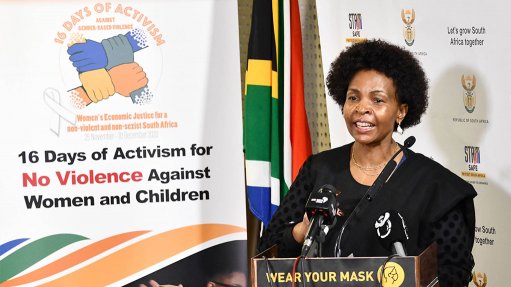
Minister of Women, Youth and Persons with Disabilities Maite Nkoana-Mashabane
The Minister of Women, Youth and Persons with Disabilities Maite Nkoana-Mashabane stressed on Friday that the participation of women in the economy is critical to ensuring that the objectives of the Economic Recovery and Reconstruction Plan are met.
She was speaking during the launch of the 16 Days of Activism for No Violence Against Women and Children campaign, at the Johannesburg Expo Centre, in Nasrec.
The event is a United Nations campaign which takes place yearly from November 25 (International Day of No Violence against Women) to December 10 (International Human Rights Day).
“At the heart of our mandate as the department is to ensure that women, youth and persons with disabilities play an effective role in representation, ownership and control of income generating assets within the economy,” Nkoana-Mashabane said.
This year’s campaign takes place under the theme: “Socio-Economic Rights and Empowerment to Build Women’s Resilience against Gender-Based Violence and Femicide: Connect, Collaborate, Contract”.
This is in line with the programmatic approach of the department which focuses on the social and economic empowerment of women. The objective of this year’s theme is to break the economic dependency of women in abusive relationships.
Given the heightened levels of violence against women, girls, children, persons with disabilities, elderly women, the LGBTQIA+ community, women migrant workers, women refugees and asylum seekers, as well as sex workers in the country, the campaign has over the years evolved into a 365 day programme to fight gender-based violence and femicide (GBVF).
This year’s theme also links the devastating impact of the Covid-19 pandemic and the long-term socio-economic impact of the virus. The effects of the virus are still being navigated and quantified, with women bearing the brunt of the shrinking economy, slow recovery, and increased unemployment.
Further global trends in the slowing down of markets and trade continue to impact on the lives of women, who form the majority of informal and unprotected economic sectors.
Nkoana-Mashabane said these conditions were fertile breeding grounds for the further marginalisation of women, predatory behaviour, increased dependency by women on men as breadwinners, and increased tolerances for abusive behaviour to access basic needs.
She further expressed excitement in bringing to life a platform that would allow women to showcase their businesses and further empower them.
“In addressing inequality, we aim to address structural drivers of GBVF and break stubborn patterns of ownership that continue to impoverish and disadvantage women. The absence of social and economic power for women creates patterns of violence and poverty which over time become self-perpetuating, making it particularly difficult for the victims to detach themselves from abusive relationships,” she said.